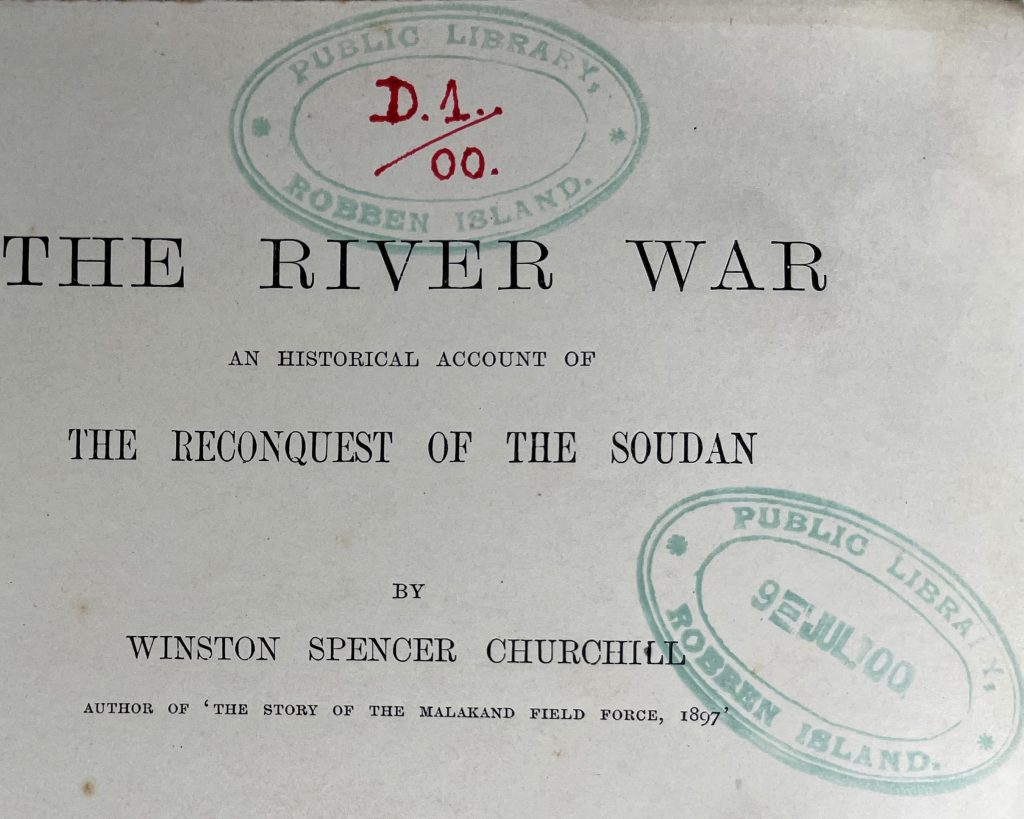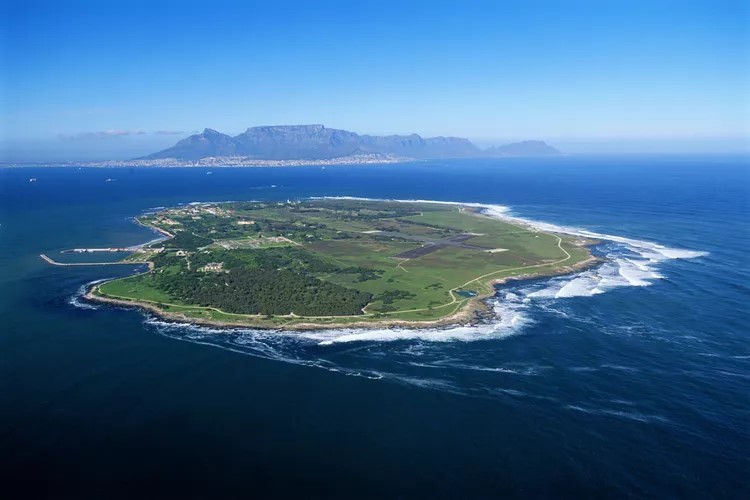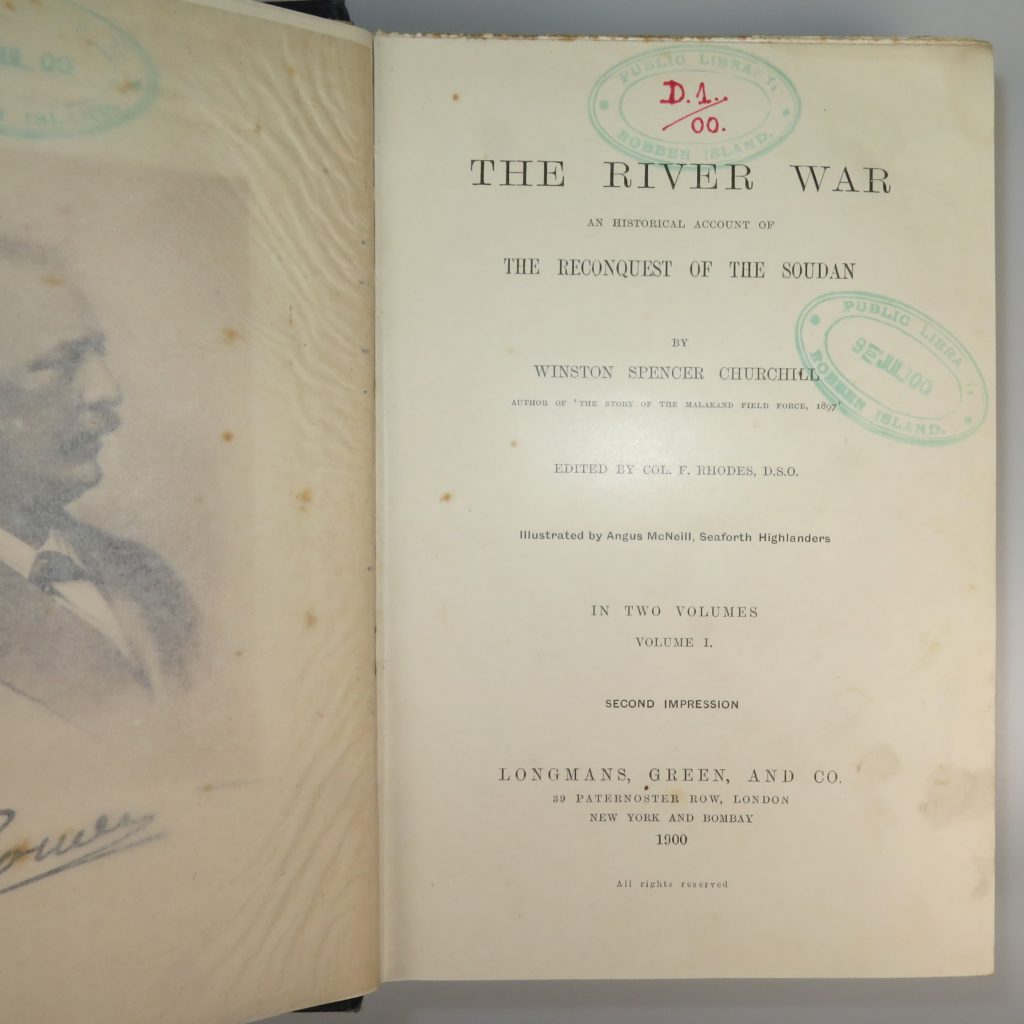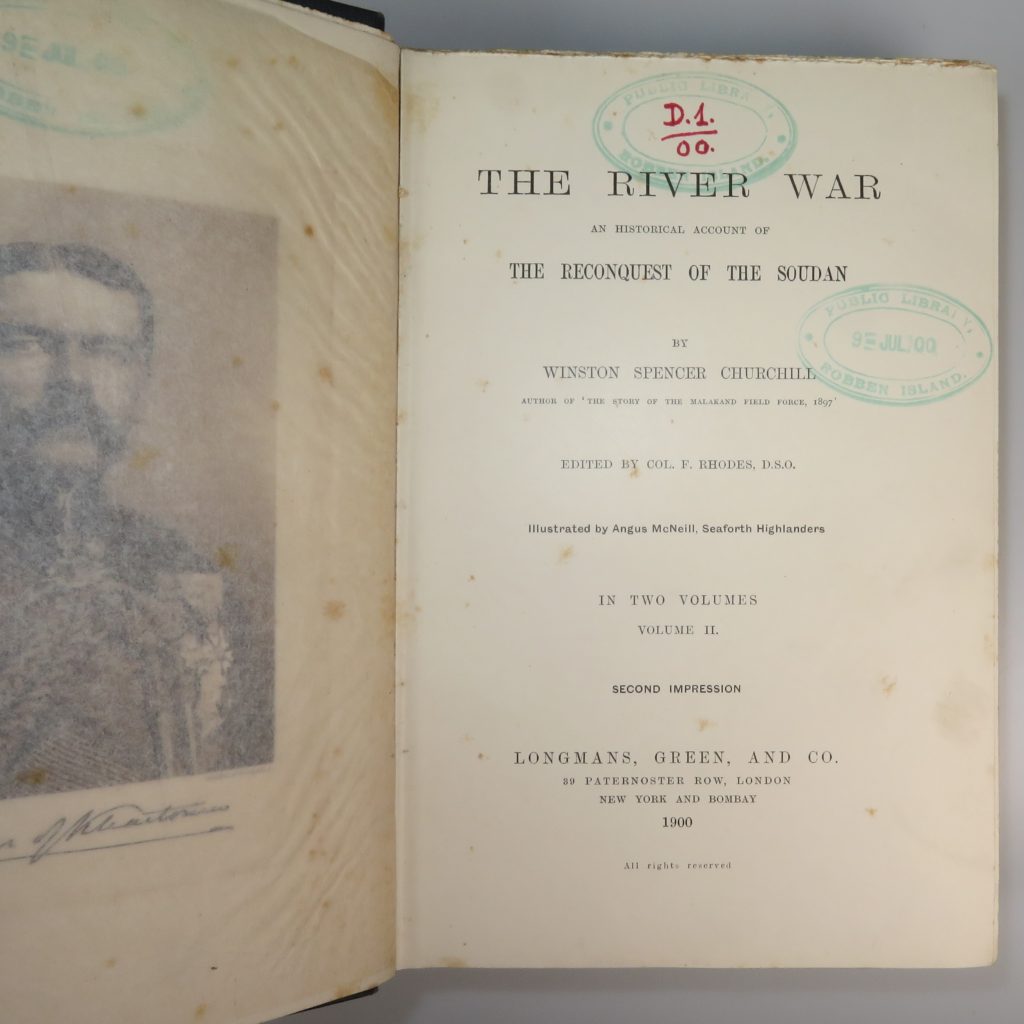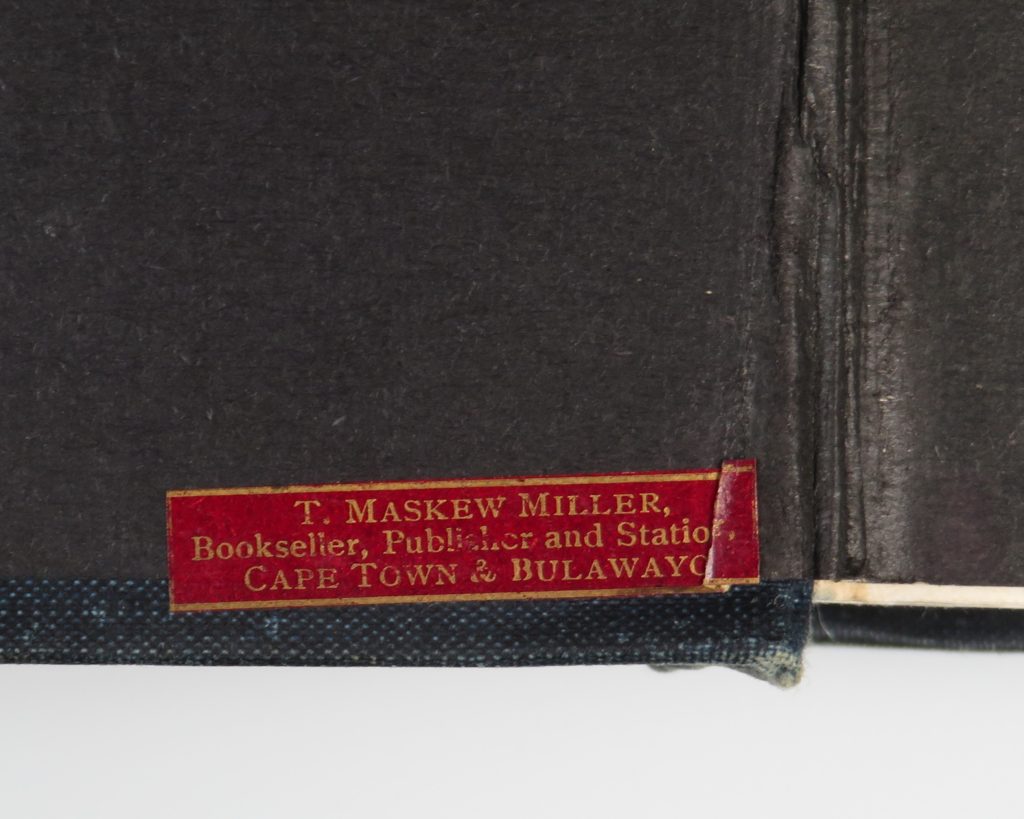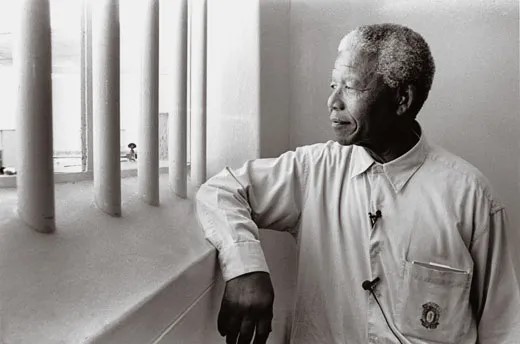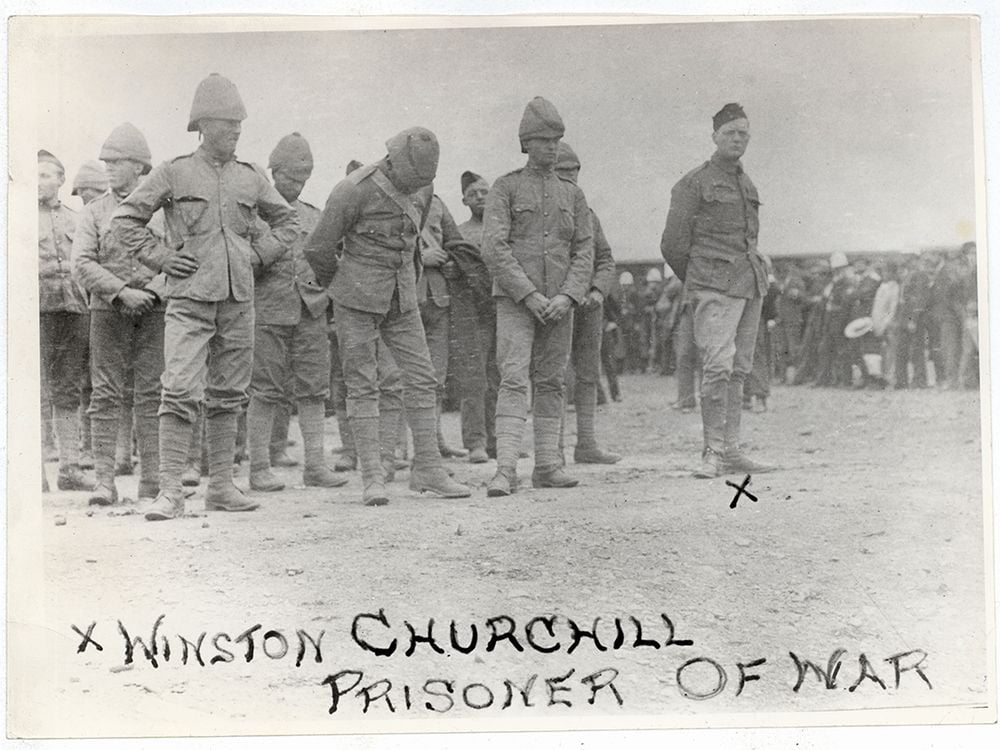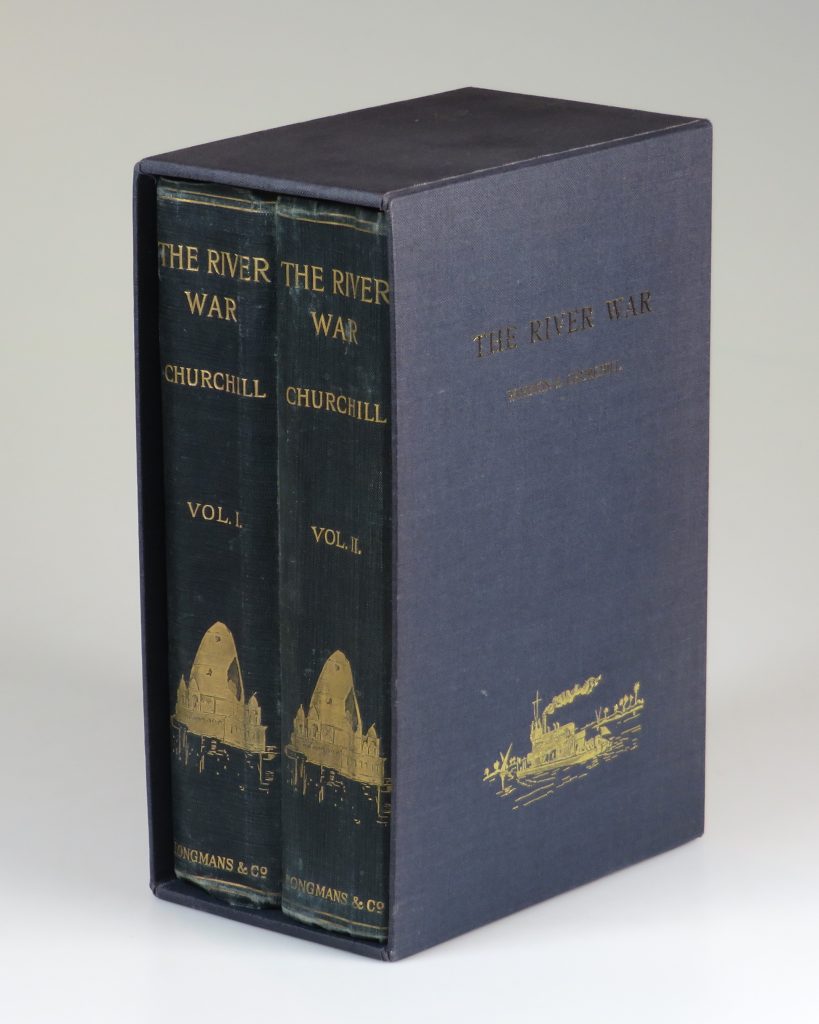We recently had the good fortune to acquire a worn but complete and fully intact ex-library set of the 1900 first edition, second printing of Winston Churchill’s The River War. This is Churchill’s second published work, the lengthiest from his time as an itinerant cavalry officer and war correspondent during the waning days of Queen Victoria’s reign.
Perhaps – understandably – this does not elicit a collector’s “Wow!” Second printing. Worn. And ex-library? But before you turn up your nose, maybe you should ask which library. This particular set was acquired within months of publication by the Robben Island Public Library, on 9 July 1900.
Tiny, 2 square mile (just over 5 square kilometers) Robben Island, off of South Africa’s western cape, began use as a place of imprisonment or exile in the mid-1600s, but gained worldwide fame as the prison that held Nelson Mandela for 18 of the 27 years of his imprisonment. During the second half of the twentieth century, Robben Island was used by the South African government as a prison for political prisoners and convicted criminals. It ceased to be used as a prison in the mid-1990s, concurrent with the fall of Apartheid and during the inaugural presidency of Nelson Mandela under a multi-racial South African democracy. South Africa declared the Island a National Monument in 1996 and the island was declared a UNESCO World Heritage Site in 1999.
Provenance of this set is unequivocal, the oval stamps of “Robben Island Public Library”, most featuring the stamped “9 JUL 00” date of accession and one, on each title page, inked by hand “D.1./00.” Dated accession stamps are found on the Volume I half title, frontispiece recto and verso, title page, first Contents page, first page of text, p.166 portrait, and each of the maps. Dated accession stamps are found on the Volume II initial blank recto, half title, frontispiece recto and verso, title page, all maps, p.270 portrait, and p.301.
There is one further bit of provenance within the set. Each lower front pastedown features the tiny, gilt-printed sticker of “T. Maskew Miller, | Bookseller, Publisher and Stationer | Cape Town & Bulawayo”. Miller (1863-1930) established his eponymous business in Cape Town in 1893, initially importing books and stationery, later expanding into publishing. His Bulawayo branch was established in 1897. It seems virtually certain that Miller originally supplied these books to Robben Island’s Library.
There are no external library marks, no card pockets or chronicle of use, and no deaccession markings. This is consonant with the fact that the library was surely a modest affair. According to the Robben Island Museum, the Robben Island Library dates from the early 1890s, during which time the island was being used to quarantine lepers and “a library was opened in a ward formerly used for the chronic sick.” The Museum states that the small population of Robben Island still supported a library in the 1920s.
Of course, any speculation regarding whether this set was ever read by Mandela is so unsubstantiated as to be fanciful. But we do know that Mandela was a voracious reader and can certainly speculate that this “tale of blood and war” and colonial subjugation of Africa would have fallen within the scope of his literary appetite. Moreover, we know that Churchill was an affecting presence during Mandela’s time at Robbin Island (1964-1982). Mandela recounted, in the late 1960s, having passages of Churchill’s wartime speeches recited to him and his fellow prisoners by an Anglican priest and, in the late 1970s, watching a documentary about the WWI sinking of Prince of Wales. Of the film, Mandela recalled: “What moved me most was a brief image of Winston Churchill weeping… The image stayed in my memory a long time, and demonstrated to me that there are times when a leader can show sorrow in public, and that it will not diminish him in the eyes of his people.” (Mandela, Long Walk to Freedom)
It requires no speculation to note the fascinating timing of this set. In October 1899, the second Boer War erupted between the descendants of Dutch settlers in South Africa and the British. Churchill, an itinerant, adventure-seeking young cavalry officer and war correspondent, swiftly found himself in South Africa with the 21st Lancers and an assignment as press correspondent to the Morning Post. Not long thereafter, on 15 November 1899 – only 8 months before the “JUL 1900” accession date of this set – Churchill was captured during a Boer ambush of an armored train. His daring and dramatic escape less than a month later made him a celebrity and helped launch his political career.
Following his escape, “For the next six months, he encountered fire, took part in the bloody and unsuccessful battle of Spion Kop in January 1900 and, as the war turned in Britain’s favour, was present at the relief of Ladysmith and the occupation of Pretoria.” (ICS) The very month this set of books was stamped in the Robben Island Library – July 1900 – Churchill arrived back home in England from South Africa. Churchill spent the summer campaigning hard in Oldham, where he won his first seat in Parliament on 1 October 1900 in the so-called “khaki election” on the strength of his status as a hero of the war.
While their paths were incomparably disparate in most respects, it can be said of both Mandela and Churchill that their paths to the leadership of their respective nations passed through South African prisons.
Though Churchill’s escape proved swift and salutary, this particular artifact of Churchill-as-author served a longer sentence. We are fortunate that these books improbably survived their term on Robben Island to find us now, oceans and continents and a century and a quarter removed from their first home.
Cheers!

